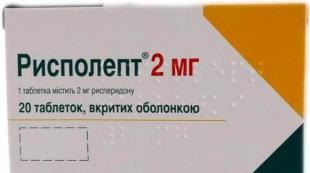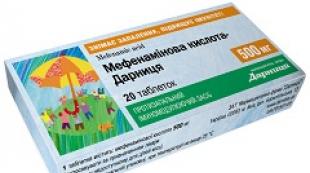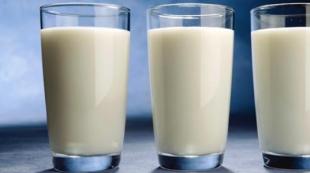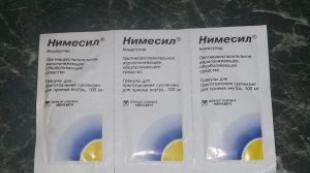Dill application properties recipes photos. Common fennel, dill, description, medicinal properties, use in folk medicine
Pharmaceutical dill, known to many as common fennel- a plant of the Umbrella family.
Also found names:
- fragrant dill;
- Timon;
- cucumber cumin;
Description
Natural habitat – most of Europe (except cold countries), northern part, both parts of America. In Russia - in the steppe regions of the Caucasus. In other parts of our country it is grown specially. Loves dry rocky soil and grows along roads.
Externally similar to dill. The main differences from dill are that fennel has a pronounced anise aroma and is also covered with a bluish coating. Pharmacy dill blooms from July to August, the seeds ripen in September.
Many peoples believed that this plant drives away evil spirits. Even if this is not the case, dill brings many benefits to people. Its stems are eaten and its seeds are used as a seasoning. It is used in medicine and perfumery. Technical oil is obtained from it. Fennel waste is feed for livestock.
Medicinal properties
Fennel has always been used in medicine. Hippocrates recommended it as a diuretic, Pliny as a remedy for the eyes, Avicenna as an expectorant. Today all listed properties have been confirmed pharmaceutical dill, plus its hypotensive (reduces high blood pressure), antispasmodic, antihemorrhoidal and lactogenic effects have been proven. Latest Research have shown that fennel lowers blood cholesterol levels.
Fennel can be called a plant for new mothers and babies. First, it helps increase the amount of milk, and second, it reduces anxiety in the tummy. For both, medications and dietary supplements based on pharmaceutical dill have a calming effect.
Medicinal use
Seeds and essential oil plants. Today, fennel is actively used to obtain natural medicines. Fennel fruits are included in pharmaceutical herbal teas: chest, sedative, carminative. The drug Anetin is produced on the basis of this plant. Homeopathic medicine Foeniculum is indicated for flatulence, loss of appetite, and also to increase lactation.
“Dill water,” known to all mothers, is an infusion of fennel, not dill. It is very effective and completely natural remedy to soothe little tummies. It successfully fights colic and gases that bother babies. Dill water is sold ready-made.
The drug Plantex – This is an extract of pharmaceutical dill seeds.
Fennel soothes tummies not only in babies, but also in adults. It helps with spasms of intestinal smooth muscles and flatulence.
Recipes
Seed infusion:
1 tbsp. pour a glass of hot boiling water, then keep in a water bath for 15 minutes. Afterwards, leave for an hour and strain from the seeds. When coughing, take 1-2 tablespoons of infusion 4 times a day.
Fennel infusion for babies

They cook it a little differently. 1 tsp The seeds are ground in a coffee grinder (if there is none, they are crushed and chopped with a knife). Pour into a glass hot water, leave for 30 minutes, filter. Babies older than 2 weeks receive 15-20 drops of infusion, infants older than a month - a teaspoon. You can add the infusion to milk or mixture. It is convenient to pour the medicine from a syringe without a needle into the cheek. Give this infusion before, during or after each feeding. This remedy is prepared daily.
Pharmaceutical dill added to a broom in a Russian bath
will fill the air in the steam room with a wonderful aroma, turning a visit to the bathhouse into an aromatherapy session. Inhaling fennel essential oils, which will be released during the procedure, is useful for bronchitis, as well as for nervous conditions.
Greens or dill seeds can be chewed at the end of a meal - this freshens the breath. That's why they bring fennel.
In this article we will talk about a plant such as dill or common fennel. This plant should not be confused with common dill. Fennel belongs to the umbelliferous (celery) family.
Fennel – herbaceous plant, but at the same time reaches large sizes. In Russia, fennel is cultivated in the Krasnodar region.
Fennel care
Optimal temperature environment for fennel to begin to germinate – 18-20 °C. Fennel can also be grown as seedlings, but it is rarely used. Fennel is sown with row spacing of 40-45 cm and a planting depth of 1-2 cm. After 20-25 days, shoots should appear. Since fennel seeds are impregnated with essential oil and do not absorb water well, sufficiently moist soil is needed for their best growth. Therefore, they are good to plant in the rain. The second feature is that fennel should not be thickened to prevent premature flowering.
Harvest
Further care for fennel consists of watering and strengthening the row spacing. Young greens are cut off when they reach a height of 25-30 cm. If the “heads of cabbage” dug up with roots are buried in sand in a cool basement, they will be stored longer. The leaves must be removed, leaving petioles about 10 cm long.
Application of pharmaceutical dill
Preparations made from fennel fruits have a slight diuretic effect and promote expectoration. Pharmaceutical dill contains anethole, which promotes mucus secretion in the lungs and intestinal contraction. Pharmaceutical dill can be useful for belching, indigestion, and bloating. Dill water - good remedy for infants with painful gastrointestinal spasms.
Pharmacy dill is prescribed for kidney stones and cholelithiasis, for chronic cholecystitis. For severe bronchitis, doctors recommend an infusion of the fruits of this plant. Essential oil helps remove toxins and carcinogenic elements from the body, and also helps relieve nervousness. For intestinal spasms and bronchitis, the dose of essential oil for children is 2-3 drops, for adults 5-10 drops.
Fennel infusion recipe
The infusion is prepared from 2 tablespoons and 1 liter of boiling water. Fennel fruits must be brewed with boiling water and left for 20 minutes. Clean the infusion with gauze. Drink the infusion before meals, about a third of a glass, 3-4 times a day.
Contraindications
When using pharmaceutical dill, you need to familiarize yourself with the contraindications. It is advisable to exclude it from the diet if you have an individual intolerance. An allergy, unfortunately, can be to anything. Fennel is contraindicated for pregnant and lactating women, as well as people suffering from epileptic seizures.
Species of the genus Fennel, family - Umbelliferae. Another popular name is dill and Voloshsky. His popularity was great in Ancient Greece and among the Romans, who suggested that the smell of fennel made a person strong, could ward off evil spirits and kill fleas, as well as freshen the air.
Fennel fruits have a sweetish taste and nice smell. The seeds are small, oval, greenish-brown in color. The Puritans often chewed them during meetings, calling fennel "seed of meetings."
Fennel: description
Fennel is a perennial herbaceous plant. Height - from 90 to 200 cm. By appearance resembles dill, and in taste and aroma it is similar to anise, only sweeter.
The fennel stem is straight, branched with a blue bloom. The leaves are pinnate with thread-like lobules. The flowers are placed at the very top, looking like complex flat umbrellas. The flowering time of the plant is July-August. It begins to bear fruit in late summer.

The fruit is a naked, almost cylindrical bifid caryopsis, which splits into two semi-fruits, the length of which is 4-10 mm, the width is 3 mm. The color of fennel seeds is greenish-brown. The smell is specific and strong.
What is fennel rich in?
Synonym: pharmaceutical dill. The fruit contains a large number of essential oil (3-6%), which contains up to 60% anethole and proteins. Fatty oil consists of petroselinic (60%), oleic (22%) and other acids.
Fennel grass is rich in glycosides, it contains ascorbic acid, carotene, minerals and B vitamins.
Fruits and contraindications
Thanks to elements such as magnesium, potassium, calcium, iron and others, the plant has a variety of beneficial features. It may act as a diuretic. The herb and fennel fruits are capable of performing a disinfectant and antispasmodic function. These properties manifest themselves so mildly during treatment that dill preparations are prescribed even to infants for flatulence. The dose for very young children should be prescribed by a doctor.
Fennel fruits are a good expectorant. They tend to have a beneficial effect on nervous system, calming her down during severe stress and aggressive behavior. Reviews of this gift of nature from traditional healers, doctors and ordinary people only positive, but on condition correct application plants.
Application in official medicine
Official medicine often uses products that include fennel. This may include tinctures and medicinal teas, which have proven themselves well in the following cases:
- in the treatment of respiratory diseases;
- to normalize digestion;
- for the treatment of heart and vascular diseases;
- to improve the taste of other medicines.
The herb, fennel fruits are antibacterial agent. « Dill water"has long been known to women; they gave it to babies when spastic colitis and flatulence. Such water can increase the secretion of glands and regulate motor function intestines.
Official medicine includes fennel fruits in anti-asthma preparations, the beneficial properties of which are very noticeable in them. From get medicinal product"Anetin", where the entire amount was used useful substances plants. The drug is widely used in therapy in the treatment of heart failure and spastic colitis.
Features of the use of fennel fruits in folk medicine
Hippocrates and Avicenna also recognized healing properties pharmaceutical dill. The fruits of which were found in homeopathy and partly in official medicine, are now also highly valued in traditional medicine. The power of this plant is in demand in various cases.

Fennel is good for bloating, during menstrual pain, at inflammatory processes eyes, for the treatment of diseases of the liver and biliary tract, as antispasmodic in the treatment of asthmatic attacks and whooping cough, from headaches due to poor digestion.
You can defeat neurasthenia by steaming with a fennel broom or using this plant in the form of an infusion.
Traditional recipes for fennel remedies
Most often in the practice of traditional medicine for preparing medicinal drugs fennel fruits are taken, the use of which is very widespread. The easiest way is to make an infusion at home. This is 2 teaspoons of crushed raw materials, poured a glass of boiling water and left for 10 minutes. Strained remedy Take 50-100 ml warm three times a day before meals. It is very good. A similarly prepared infusion, with only half a liter of water and a tablespoon of fennel, has proven itself well in the treatment of respiratory diseases.

Here are some more traditional medicine recipes. To treat indigestion, a mixture of medicinal plants is prepared: fennel and caraway fruits - 10 g each, peppermint, navel flowers and lemon balm leaves - 20 g, 15 g each, wormwood herb - 5 g. All ingredients must be crushed and mixed, then Brew one teaspoon of the mixture with a cup of boiling water. Drink three to four cups per day. You need to take it until complete recovery.
Recipe for improving lactation in nursing women. Grind:
- sprouted barley seeds;
- the entire above-ground part of oats;
- hops (cones);
- galega (flowers);
- fenugreek (seeds);
- dill;
- anise;
- caraway.
Everything is taken in equal parts. Brew two tablespoons of the mixture with 0.5 liters of boiling water. For effective impact You need to drink about 1.5 liters of infusion per day.
Recipe for spasm relief. teaspoon medicinal mixture, consisting of fennel seeds, anise, linden and poppy flowers, taken in equal parts, pour a glass of boiling water. Strain after 10 minutes and drink the day before, adding honey.
Fennel for weight loss
It has been used for weight loss since the time of Hippocrates. Fennel fruits are especially valuable. This plant has many qualities due to which it is considered indispensable during weight loss. Fennel helps calm hunger, reduces sugar cravings, and speeds up metabolism. To overcome increased appetite, you just have to chew the seeds of the plant - and the desire to deviate from the diet will immediately disappear.
To get rid of extra pounds Tea containing fennel (fruit) is very useful. Instructions for preparation and use are as follows. Pour 750 ml of boiling water over two teaspoons of nettle and one teaspoon of fennel fruit, keep on low heat for 15 minutes and leave covered for another 15 minutes. Drink one glass of this decoction during the day in four doses, drink before meals.
Next recipe. Grind fennel fruits, mint leaves, linden and chamomile flowers and mix. Pour a teaspoon of the medicinal mixture into a glass (200 ml) of boiling water and leave for 20 minutes. Drink the infusion at one time. You need to do this for a week. This remedy will help you feel better during your diet, calm your nerves and reduce your appetite.
You won’t be able to lose weight by taking fennel itself, it can only be an assistant during diets and relieve excessive appetite and wakes up the sleeping metabolism.
How is fennel used in cooking?
Fennel is valuable not only as a medicine, but also as a spice that can give dishes a unique, special taste and specific aroma. Fennel is valued in cooking all over the world. Pharmaceutical dill is added to soups, salads, snacks, and prepared from it independent meals. During harvesting, fennel seeds are dried, crushed, and then used as a seasoning for fish and meat. They make delicious tea.

Green fennel fruits are also suitable for consumption. They are added to veal, lamb and fish dishes.
Fennel fruits: contraindications
The main contraindication is intolerance to fennel and hypersensitivity, when a person may experience dizziness and nausea just from the smell of the plant.

Excessive consumption of fennel for people with epilepsy is very dangerous. This may lead to fatal outcome. Pregnant women and nursing mothers are recommended to use it only with the permission of a doctor.
Perhaps you have ever noticed a tall, fragrant bush that resembles dill, but is taller and more delicate? So, this is dill, also known as Voloshsky fennel, common fennel. In central Russia, this plant is not very well known and is not particularly popular. Although completely in vain.
Fennel - Foeniculum - is a perennial or biennial herbaceous plant from the Apiaceae family. Thick taproot The plant resembles a spindle. It has a cylindrical branched stem up to 2 meters, and sometimes more, in height.
The leaves are green, pinnately dissected, resembling a light openwork. Small yellow flowers are collected in complex umbrella inflorescences. Fennel blooms in July or a little earlier, depending on the weather, and blooms until August. All parts of the plant have a pleasant aroma and sweetish taste, so they pollinate it honey bees. The fruits, brownish-greenish cylinders, which then disintegrate into achenes, ripen in September-October.
Fennel is practically never found in the wild. Cultivated fennel and vegetable. Fennel prefers warm climates and calcareous soils. The homeland of fennel is called the Mediterranean. Nowadays it is cultivated in almost all European countries, especially in France, Italy, Argentina, and Japan. It is also bred in Ukraine, Belarus, Poland, Moldova, and in countries Central Asia and in Transcaucasia. In Russia, fennel is sown in the Krasnodar region.
Despite the fact that dill is a relative of fennel, they should not be sown next to each other, because they do not like each other.
The entire pharmaceutical dill plant contains vitamins C, B, E, K, PP, carotene, proteins, sugars, and essential oil. How medicinal plant fennel has been used since ancient times by the Greeks, Egyptians, and Chinese, and only in the Middle Ages did Europeans begin to do the same.
Traditional medicine uses fennel seeds and herbs and much less often - roots.
Preparations from pharmaceutical dill help increase appetite, mood, immunity, relieve stomach cramps, flatulence, have antibacterial and anti-inflammatory properties.
A decoction of the seeds helps with nausea and vomiting, also acts as a mild laxative.
It is also prescribed for cholelithiasis, smallpox, as well as colds, flu, bronchitis and eye diseases.
Brew 1 teaspoon of seeds with 1 incomplete glass of boiling water (to the rim), leave for 10 minutes and drink 1 tbsp. spoon 4-5 times a day before meals or an hour after it.
Pharmaceutical dill seeds, brewed as tea, are given to children when bloating, and for nursing mothers - for increase lactation.
With, flatulence, gallstones and kidney stone diseases make this infusion:
2 tbsp. spoons of fennel seeds are poured into an enamel bowl and poured with 1 cup of boiling water, bring to a boil, reduce the heat and simmer for 10-15 minutes. Cool, filter, add boiled water to the original volume of liquid and take ¼ glass 3-4 times a day 20 minutes before meals.
Dill seed tea increases potency. Fennel is generally very beneficial for male body its ability to support male strength until old age. Tea made from it is also useful for intellectuals, as strengthens memory and stimulates the thinking process.
Insects do not like the smell of fennel. A drop of oil from this plant also helps to ward off a cat if he goes to the toilet in in the wrong place. But pure essential oil cannot be dripped onto furniture or carpet - it will leave a stain. It is better to wet a small piece of cotton wool and place it on this place.
It’s also a good idea to add a drop of fennel essential oil when rinsing socks and underpants, especially men’s.
In people, the smell of fennel improves mood and helps get rid of heavy thoughts and depression. However, fennel should not be consumed if you are pregnant or have epilepsy.
Baths with the addition of fennel decoction make the skin smooth and elastic. If you wipe your face with the decoction in the mornings and evenings, your skin will noticeably become younger. Such rubbing is especially useful for mature ladies. And one drop of fennel added to the cream effectively fights cellulite.
Once upon a time, fennel was part of absinthe - once the most popular alcoholic drink. Fennel leaves, shoots, seeds, heads and roots are used in cooking, both boiled, stewed and fresh.
Heads of cabbage can be prepared according to the same recipes as cauliflower or asparagus. Fresh leaves and shoots are used in salads, and umbrellas with seeds will add a touch of originality as sauerkraut, so pickled cucumbers, tomatoes. Fennel roots are used in the same way as parsley root: in seasonings, sauces, soups, boiled as a side dish, fresh when salted. Dill seeds are used in baking.
It is believed that if you eat at least a little greenery or heads of fennel, the overall aging process of the entire body will slow down.
Fennel with duck
You will need:
1 small duck;
- 2 onions;
- 100 g fennel;
- 25 g parsley;
- ½ stick of butter:
- 4 cloves of garlic;
- 2 glasses of water;
- 2 bay leaves;
- salt, pepper to taste.
Cooking method:
Cut the duck into portions and dry, fry on butter on all sides, transfer to a roasting pan. Fry the chopped onion in this oil until golden brown and transfer it to the duck. Add water, salt and pepper and simmer under a closed lid over medium heat until cooked. remove and place on plates. Chop the greens and put them in a frying pan, simmer a little, add chopped garlic, Bay leaf and after 5 minutes turn off the heat. Pour the prepared sauce over the duck.
Stewed vegetable fennel
You will need:
400 g fennel heads;
- 2-4 onions;
- 1/3 stick of butter;
- 1 glass of meat broth:
- salt, pepper to taste.
Cooking method:
Finely chop the onion and fry in butter in a deep frying pan. Wash the heads of cabbage, chop them and add them to the onion, add a little salt and pepper, add broth and simmer for about half an hour over low heat.
Magicians believe that fennel seeds ward off evil spirits, and therefore advise scattering them near the threshold or hanging plant umbrellas over the door. If you need to ward off a rival from your husband, the seeds are poured into the husband’s pocket or under the insoles of his shoes.
In order for there to be peace and harmony in the house, experts advise putting a drop of fennel essential oil into an aroma lamp in the room where the whole family gathers.
Common fennel (fennel) is a herbaceous biennial or perennial plant of the Apiaceae family. It has long been cultivated as an edible and medicinal plant.
Blank
As medicinal raw materials Usually the fruits and greens (leaves) of fennel are used. Leaves are harvested throughout the summer: collected, washed in running water and dried. It is recommended to store dried fennel greens in a tightly closed glass jar for 1 year.
The fruits are harvested after they are fully ripe in the fall, when they already have Brown color: collect umbrellas with seeds and dry them in a well-ventilated area or in the shade. The dried raw materials are threshed. Store seeds in a tightly closed container for up to three years.
Sometimes fennel root is used, which should be harvested in the fall. The dug up roots are washed, dried, cut into pieces and dried or frozen.
Composition and properties
Fennel is rich in: flavonoids, glycosides, vitamin C, carotene, essential oil, camphor. The fruits contain a large amount fatty oils, essential oil, potassium, iron, calcium and other useful elements.
Preparations prepared from fennel have antibacterial, antispasmodic, carminative, mild diuretic, and sedative effects.

IN folk medicine fennel is used for:
- cough, cold;
- nausea;
- abdominal pain;
- flatulence;
- constipation;
- kidney diseases;
- conjunctivitis and other eye diseases;
- insomnia;
- skin diseases.
Fennel infusion called " Dill water» used to treat gas in young children.
Recipes
Infusion:
- 2 tsp chopped fennel fruits;
- 1 tbsp. boiling water
The infusion has a good carminative effect, helps with urolithiasis and spasms in gastrointestinal tract. Pour boiling water over the fennel and let steep, covered, for 10 minutes. Strain the infusion. Take 50-100 ml warm three times a day 15-20 minutes before meals.
If you take 1 tablespoon of fennel and 1 liter of boiling water, then in the same way as in the previous recipe you can prepare an infusion for coughs and other respiratory tract diseases.

Decoction for chronic cough:
- 1 tsp chopped fennel fruits;
- 200 ml hot water.
Cover the fennel with water and simmer for 30 minutes. water bath over low heat. The decoction will also help with flatulence.
Fennel fruits not only have a diuretic effect, but also help get rid of hunger, which allows them to be used as a means for weight loss. The most pleasant and in a simple way their application in in this case is tea:
- 20 g fennel fruits;
- 1 tbsp. boiling water
Pour boiling water over the seeds and simmer over low heat for half an hour. Then remove the resulting decoction from the stove and let it brew for 30 minutes - the tea is ready.
Cataract treatment:
- 1 tbsp. fennel seeds;
- boiling water.
Rinse fennel seeds in cold boiled water, chop and place in a small bag made of several layers of gauze or cotton fabric. Place the bag of fennel in boiling water for 2-3 minutes. Next, cool the bag to an acceptable temperature and rinse your eyes with the liquid squeezed out of it.

Dip the bag into boiling water again, take it out and apply it to the sore eye, securing it with polyethylene - keep this compress until it cools down. The procedure is best performed lying on your back. Repeat rinsing and compresses twice a day (morning and evening) for 6-8 weeks.
Juice for menstrual irregularities:
- 1 part fennel herb juice;
- 1 part carrot juice;
- 1 part beet juice.
Squeeze the juices from fresh fennel, carrots, beets and mix them in equal parts. Drink 100 ml of this mixture twice a day.
Strain the finished broth. Take 2 tablespoons three times a day 15 minutes before meals.
Collection for gastro-food reflux:
- 1 part fennel fruit;
- 1 part lemon balm leaf;
- 1 part chamomile flowers;
- 1 part marjoram herb.
Prepare a collection of these herbs. Pour two teaspoons of the resulting herbal mixture 150 ml of boiling water and let it brew for an hour. Strain. Drink this infusion three times a day before meals.
Collection for gastritis:
- 1 tsp fennel fruit;
- 1 tsp chamomile leaf;
- 1 tsp wheatgrass root;
- 1 tsp marshmallow root;
- 1 tsp licorice root.

Prepare a mixture of the above plants. In the evening, brew 1 teaspoon of the resulting mixture with 200 ml of boiling water and leave to steep for an hour. Strain the resulting infusion, thoroughly squeezing the raw materials and drink at night.
For bronchitis, fennel essential oil, added to warm boiled milk in the ratio: 5-10 drops of oil per 200 ml of milk, helps well.
Contraindications
Fennel is contraindicated for:
- pregnancy and with caution when breastfeeding;
- heart rhythm disturbances;
- diarrhea;
- epilepsy;
- individual intolerance.
Taking medicines prepared from fennel should start with small doses to make sure there is no allergic reactions and intolerance to this plant. Before treatment, you should consult your doctor.









